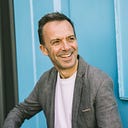When the best path is the least efficient one.
In an episode of the Harvard Business Review podcast, HBR’s Dan McGinn wondered what would have happened had the consulting firm McKinsey looked at a more ‘efficient’ way of making Jerry Seinfeld’s eponymous TV show.
Jerry told Dan that he didn’t need McKinsey:
“If you’re efficient, you’re doing it the wrong way. The right way is the hard way. The efficient way is the wrong way.”
It made me think how efficient my self-employed work life might look to an outsider and what McKinsey might say about it.
Many freelancers treat self-employed life as a strict business model, charging the highest possible day rate and billing as many days a week as possible. That’s their formula.
Currently I’m running day-long workshops around the UK for the BBC. The most efficient model for running a workshop in a city away from home is to arrive the night before and then disappear as soon as the workshop ends. That way you maximise your billable days.
But I don’t try to monetise every fragment of my working week. I don’t measure my time that way.
After all, this is my life, not an economic model.
Last month in Manchester, I’d arrived in the city early afternoon with a few hours to kill. A friend suggested visiting The Refuge (above), a majestic space that houses a cafe, bar and restaurant. Sitting with a coffee, listening to Across 110th Street blast through the vast, high-ceilinged space, I was in my element — making notes, getting clarity. And it got me in a great mindset for my workshop the next day.
This month in Belfast I gave myself a couple of hours off before catching my flight home. I visited a food market one of my delegates had suggested; I found a fabulous coffee shop (‘Established’) recommended to me on Twitter. One of my delegates gave me a drive-by history lesson, showing me the Falls Road, the Shankill Road and the Peace Wall. It was an eye-opening experience I would have missed out on had I’d rushed to get away.
So instead of trying to attempt my trips in the shortest time possible, I’m carving out time around the edges for ‘exploration’. Mornings and afternoons I spend in each city are effectively dead-time as I can’t invoice anyone for them. But actually this time is essential to me, and important to my work. Because these times give me experiences that fuel me and boost my creativity: walking around a city, following my curiosity, taking the side streets, finding a coffee shop, chatting to strangers, scribbling down thoughts and ideas.
These non-billable day parts have become essential punctuation marks in my working life. I love, and need, the time to explore and reflect.
If you’re a business leader or an executive in an organisation, being busy all week might appear efficient on the surface, but the reality is that filling all your waking hours with meetings, tasks and structured activity will end up stifling both your creativity and your productivity. Creating the time and space to go off-schedule — to be curious, to discover and explore new ideas, places and experiences — is vital to help us create our best work.
The way I approach my working life might be viewed as being under-efficient, but it fires me up. So I’m sticking to it.
